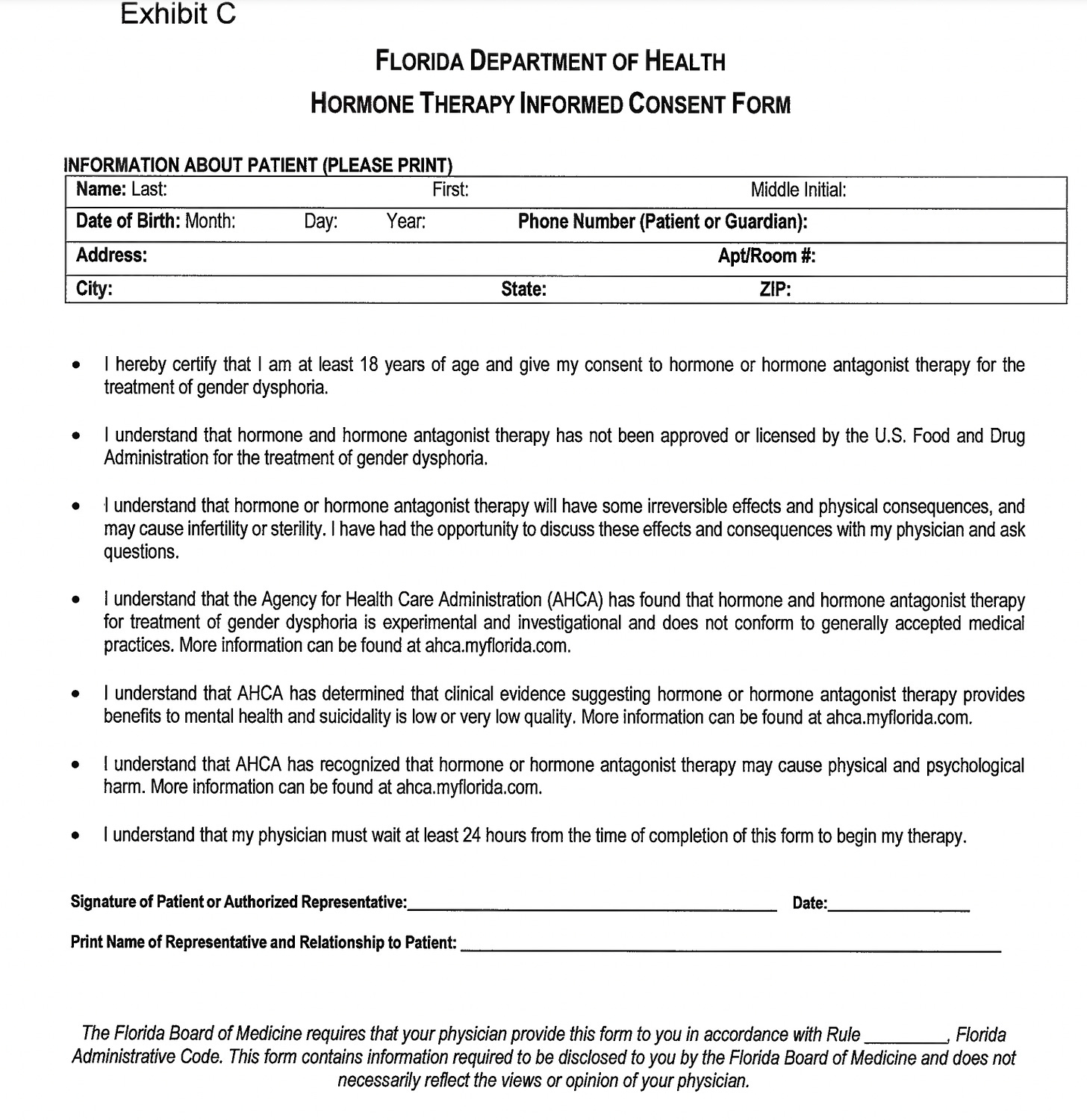Trans Patients Being Dropped As Florida Law Bans "Up To 80%" Of Adult Gender Affirming Care
Most media coverage on the impact of SB254 in Florida has focused on the youth care prohibition. In reality, it threatens 80% of all trans adult care by banning nurse practitioners from providing it.

A new Florida law threatens to disrupt up to 80% of gender affirming care for transgender adults, yet this impact has been largely underreported. The legislation, SB254, has been passed and will go into effect when signed by Governor Ron DeSantis of Florida. It has caught the eye of LGBTQ+ media primarily due to its impact on transgender youth as outlined in the bill's provisions: it outright bans gender affirming care for this demographic, and may also introduce complexities in custody scenarios where parents disagree on affirmation.
While the majority of discourse around SB254 focuses on its repercussions for transgender youth, a provision that has received less attention within the bill is already spelling disaster for transgender adult care. The legislation bars all nurse practitioners from offering gender affirming care and imposes additional restrictions on informed consent care for transgender adults. Considering that nurse practitioners provide the majority of gender affirming care, this could drastically reduce the number of providers, lowering it to a level that is unsustainable for Florida's transgender patient population.
In an exclusive conversation with Lana Dunn from SPEKTRUM Health, the clinic has indicated that it is getting a near constant influx of phone calls from patients whose appointments are being cancelled. Reasons for cancellation include that the care is too difficult to provide now given new liabilities introduced by this law and restrictions on perscribers. While SPEKTRUM is still providing care, Dunn indicates that they are in an uncomfortable limbo:
“We have thousands of patients at SPEKTRUM, all of whom are eagerly trying to get their appointments in before the law goes into effect and we simply have no way to keep up with the demand. Our team has been working feverishly throughout all of this to meet the demand,” Dunn says.
When asked about organizations that are ceasing care, she even indicated that once the law takes effect, SPEKTRUM may have to cease care: “Here at SPEKTRUM we are operating at the highest capacity possible until such a time as the law goes into effect at which point we will have no choice but to cease providing gender affirming care.”
The provisions causing trouble for organizations are seen here:

These provisions taken together spell out requirements for providers of gender affirming care that will drastically lower its availability to transgender adults. SPEKTRUM has confirmed that at least 80% of all gender affirming care is provided by nurse practitioners in the state. This matches with data from my informed consent hormone therapy map - very few of the locations go to MDs/DOs. Planned Parenthood, which provides a huge amount of the care, primarily uses nurse practitioners to administer that care - all of my personal care has been handled by nurse practitioners, as seen from Planned Parenthood’s FAQ on gender affirming care:
Most gender-affirming hormone care is provided at PPSP by advanced practice providers (physician assistants, certified nurse midwives, and nurse practitioners) in our health centers or over telemedicine.
The alarming aspects of the new legislation are not limited to the provisions that prevent nurse practitioners from providing gender affirming care. The law also targets this care through various other channels. For example, one provision grants the board of medicine authority to adopt emergency rules for implementing the new law. The board has already demonstrated its willingness to overstep existing law by introducing rules - earlier this year, it imposed a ban on gender affirming care for transgender youth, despite lacking legislative instruction to do so. This ban is currently under judicial review.
In a similar vein, the attorney general of Missouri recently issued a series of burdensome guidelines that essentially obstruct gender affirming care for most transgender adults with a complex web of rules, making the care nearly impossible to legally provide. This decision, however, has recently been blocked in court for at least two months. The provision in Florida's law, which grants rule-making authority to the board of medicine, could potentially be wielded in a similar manner to further restrict care.
The legislation also requires misinformation in informed consent forms that must be handed to and signed by every patient. Though the final version of the form is not available, earlier versions have statements erroneously claiming that the care does not conform to generally accepted medical practices. Over 29 major medical organizations maintain gender affirming care as the standard of care for trans people.
See the proposed form from 2022 when the issue was first discussed by the Florida Department of Health here, documented by Zinnia Jones:
It remains to be seen how medical organizations and transgender adults will react to the bill if it is signed into law. It is clear that at least some major medical organizations feel that the care is highly threatened, with many being forced to cease providing it. The impact of this legislation could rival and even surpass other states where restrictions are currently being fought over, such as in Missouri where several trans adults were pulled from care before the policy enacted there was blocked. When combined with a recent transgender bathroom ban, Florida is quickly emerging as the state most hostile to transgender people in the United States.




It's such a tragedy. Thank you for putting this together, Erin. A few days ago, I tried to pull out basic information from the Florida bill itself —
https://tuckerlieberman.medium.com/florida-gender-affirming-care-custody-trans-kids-55c5310441cd?sk=2fe698ed4198e71c51c94422038c2533
— but the information you've got here is more specific. Medical organizations having really hard conversations now. The (dis)informational forms they'll have to print up. Heartbreaking. These are real people's lives and bodies.
I updated my article on Medium just now to include a link to this Substack article of yours at the bottom.
I’m in Florida and get care from an MD. They’re suspending care until they can get a better handle on how their insurance is going to be effected. The civil liability clause at the end of this law about being able to sue if your detransition could essentially price a lot of small practices out if it hits their liability premiums. So even if you have an MD or DO, they may not be able to keep prescribing. It’s insane.